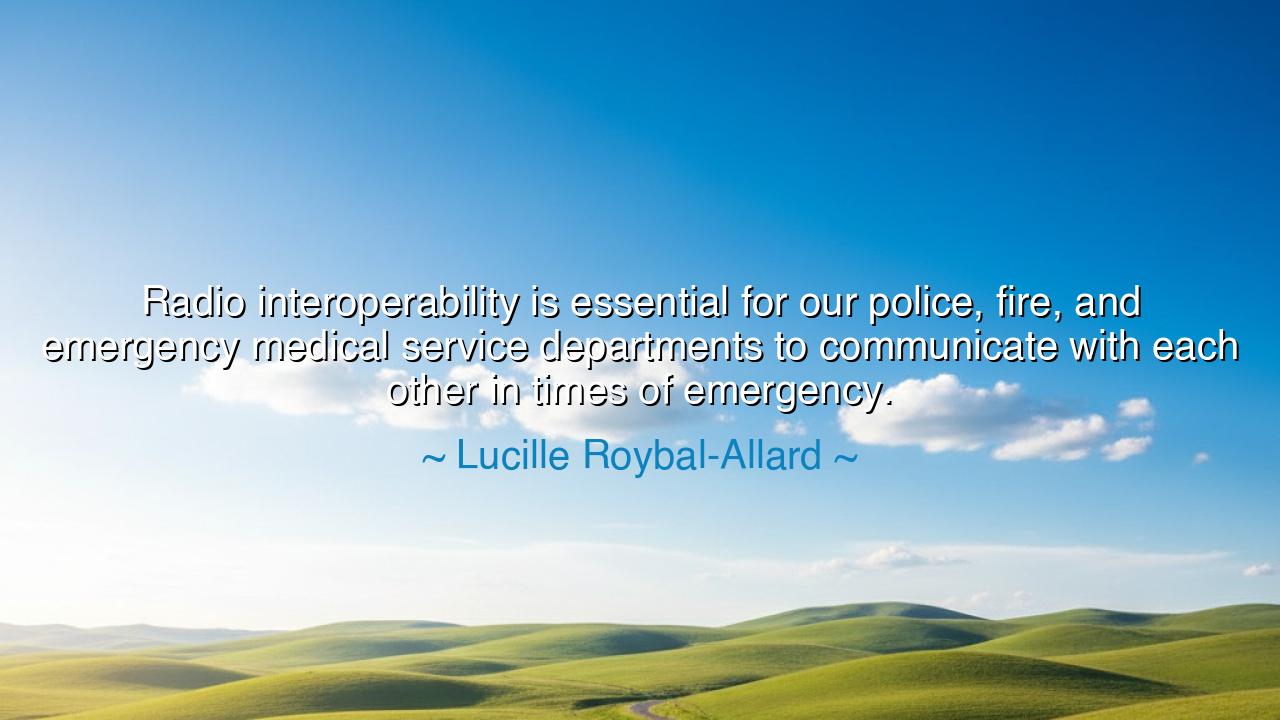
Radio interoperability is essential for our police, fire, and
Radio interoperability is essential for our police, fire, and emergency medical service departments to communicate with each other in times of emergency.






In the solemn words of Lucille Roybal-Allard we hear a warning and a call to vigilance: “Radio interoperability is essential for our police, fire, and emergency medical service departments to communicate with each other in times of emergency.” At first, her words may sound like the language of policy, of technology, of wires and signals. Yet in truth, they carry the deeper wisdom of survival, unity, and the sacred duty of guardianship. For when the world trembles, when flame and flood and violence threaten, it is not the strength of one hero alone that saves lives—it is the harmony of many working as one.
The essence of interoperability is not merely technical—it is the ancient truth of cooperation. What good is the courage of the fireman if he cannot hear the cry of the medic? What good is the vigilance of the police if the flames rage where no one can tell them? In times of emergency, every second is weighed against death, every message carried or lost may mean the difference between salvation and tragedy. Thus, Roybal-Allard teaches that the tools of communication are as vital as the bravery of the heart.
We need not look far into history to see her words made flesh. On the morning of September 11, 2001, when the towers fell in New York City, countless lives depended upon the voices traveling through radios. Yet in that hour, fire departments, police forces, and paramedics often could not reach one another across fractured systems. The heroism was unbroken, but the channels of speech were broken, and lives were lost that might have been spared. That day became a testament to the cost of disunity, and from its ashes arose the recognition that to fight disaster, the guardians of the people must be bound not only by courage, but by a shared voice.
Think of the ancients upon the battlefield. In the days of the Roman legions, the signal of the horn or the waving of the standard was the difference between victory and chaos. If one cohort could not hear the call of another, the enemy found its opening and destruction followed. So too in the wars against nature’s fury: police, fire, and medical service are not separate armies, but three arms of the same body. Their radios are the horns that call them into formation, the lifeline that turns scattered efforts into united defense.
The teaching here is not confined to technology or to those who wear the uniform. It is a universal law of life: without communication, even the bravest falter. Families fall into bitterness when voices go unheard. Communities fail when neighbors refuse to speak. Nations weaken when leaders cannot or will not find common ground. To ignore the channels of connection is to invite ruin. To strengthen them is to prepare for triumph, even against the fiercest trial.
So let us draw the lesson: build your bridges of speech before the storm comes. Do not wait for fire to rise before deciding how you will call for help. In your own life, cultivate interoperability—in your family, your work, your friendships. Create ways for voices to be heard, for disagreements to be resolved, for swift and honest words to travel where they are most needed. Just as emergency services must share one channel in times of peril, so too must we ensure that in moments of conflict or hardship, our own voices can reach those we depend upon.
And so, Roybal-Allard’s words are not simply about radios. They are about the eternal need for connection, for unity in the face of danger. To live them is to prepare, to honor the bonds between guardians, and to remind ourselves that in times of emergency, no one stands alone. If we remember this, if we weave stronger channels of communication in all that we do, then when disaster comes—as it always will—we shall stand not as scattered voices lost in the wind, but as a chorus strong enough to save lives, and strong enough to endure.






AAdministratorAdministrator
Welcome, honored guests. Please leave a comment, we will respond soon